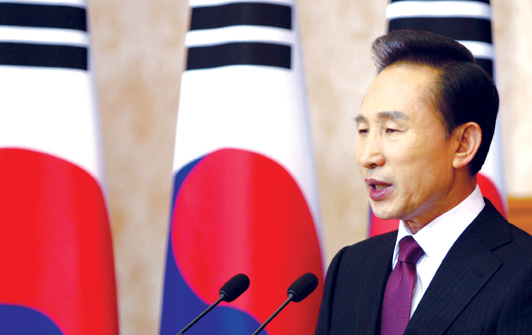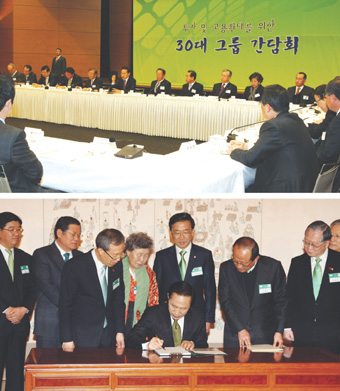President Lee to Focus on Economy This Year
G-20 Summit will help strengthen national status

President Lee Myung-bak has been determined to rescue the nation from the unprecedented crisis triggered by the subprime mortgage debacle in the United States since he took office.
Now, given an apparently rebounding economy at the fastest pace among OECD member nations, he seems full of confidence and a ¡°can do¡± spirit. The ever-growing approval rating for the president, as seen in various surveys, has been providing Lee with further chances to push ahead with his economy-first policies.
The president said in his New Year¡¯s address on Jan. 4 that economic recovery, including promoting job creation, is the government¡¯s top priority for 2010.
With the goal of creating more jobs, he said, the service industry will be promoted and small and medium-sized businesses with cutting-edge innovative capabilities will be fostered. For the sluggish job market, the government will establish an integrated information network and bring about innovation in the job training system.
The president said the government will do its utmost to create a virtuous cycle of economic recovery leading to job creation, and to that end, he will hold a ¡°strategic meeting for job creation¡± every month.
The government will continue its efforts to improve education by normalizing public education, reducing private tutoring expenses and introducing a tuition loan system that allows repayment after borrowers get a job.
Colleges may also get the right to decide their own admissions policies and students will no longer depend on private education to prepare for the college entrance test, he said.
The government is determined to foster an educational environment where students can enter the colleges they want without expensive private lessons, he added.
The president also promised to make 2010 a turning point for the balanced development of all regions of the country.
About 100 trillion won in state funding over the next five years will be used to foster the industries that provinces and municipalities want the most, nurture human resources, expand key components of infrastructure and enhance living conditions.
He said he will pursue reforms aimed at advancing politics. ¡°The nation needs to set down new political roots through systemic reform and achieve a blossoming of politics through a reform of the political culture,¡± he added.
Lastly, the president pledged multi-directional diplomacy with every country on all six continents and five oceans while trying to elicit substantial changes in inter-Korean relations.
In November, Korea will host the Group of 20 Summit and other large and small conferences, which will serve as a great catalyst in building an even greater Korea, the president said.
Regarding inter-Korean relations, the president said he hopes efforts to denuclearize North Korea will see quantum progress and help facilitate full-fledged inter-Korean collaboration, thereby greatly improving the living standards of the North Korean people.
Lee has also been focused on a successful holding of meetings of the leaders of the world¡¯s major economies to institutionalize the Group of 20 as a permanent council on global economic cooperation, for which Korea was selected to host a summit this November.
The leaders of the world¡¯s 20 largest economies will meet in Canada in June and Korea in November for economic policy coordination, President Lee Myung-bak and Canadian Prime Minister Stephen Harper announced in a joint press conference in Pittsburgh, Pennsylvania, the United States, broadcast live on Sept. 25.
¡°First, let me inform our citizens that it was decided to hold the 2010 G-20 summit in Korea in November,¡± the Korean president said at the press conference, adding that the decision passed unanimously. Canada will host the fourth G-20 meeting in June on the sidelines of the G-8 summit there. The June summit will be co-hosted and co-chaired by Korea, Harper said.
G-20 leaders will gather once a year for a routine summit starting in 2011. In the interim year of 2010, Canada and South Korea will host two rounds, in June and November, respectively. Korea assumes the forum chair this year.
The Group of 20 Finance Ministers and Central Bank Governors ¡ª known as the G-20 for short ¡ª was created in response to the financial crisis of the late 1990s and to growing recognition that emerging economies were not adequately included in the core of global economic discussions and governance.
The first heads-of-government-level G-20 financial summit took place in Washington in November 2008 to address the aftermath of the financial meltdown that hit the world earlier that year. Another round of meetings took place in London, and the September meeting in Pittsburgh was the third of its kind.
During the latest meeting, the leaders agreed to transform the forum into the world¡¯s main body for coordinating economic policy. The G-20 economies comprise 85 percent of the gross world product, 80 percent of world trade and two-thirds of the world¡¯s population.
Following 2009¡¯s G20 Summit, the global attitude towards Korea has completely changed. The president¡¯s proposals for solving the global economic crisis and environmental issues have been getting attention and support and, thus, Korea has successfully made a transition from the title ¡°Korea Discount¡± to ¡°Korea Premium.¡±
The president has been making progress in collaborating with individual countries in the hopes of solving these global issues: he has effectively accomplished an alliance with the United States on cooperating to combat the 21st century¡¯s global environmental issues; a collaboration with Japan on future problems; and an atmosphere of sharing strategies with Russia and China. Most importantly, President Lee has succeeded in reaching an agreement with the United States in maintaining the U.S. armed forces in South Korea at their current level, as well as elevating the rank of Korea¡¯s Foreign Military Sales (FMS).
Also, the president has managed to widen the diplomatic horizons from the regional four great powers (China, Russia, Japan and the United States) through his New Asia Diplomacy. He visited New Zealand, Australia and Indonesia last March and proclaimed the basis of this diplomatic push. He built a relationship with Uzbekistan in strategic planning and signed a Memorandum of Understanding (MOU) with Kazakhstan.
Korea has signed Free Trade Agreements (FTA) with the United States, the Association of Southeast Asian Nations (ASEAN) and India and, as of last October, with the European Union (EU). This is noteworthy, for Korea is the first of all the Asian countries to have agreements with the two global economic super powers, the United States and the EU.
The planned G-20 meeting is significant for Korea in its bid to join the ranks of developed nations, as it will help polish the nation¡¯s status in the international community. nw
President Lee Myung-bak delivers the 2010 State of the Nation Speech at Cheong Wa Dae on Jan. 4.
(above) President Lee presides over a meeting of the chairmen of the top 30 conglomerates on investments and job creation on Jan. 15. President Lee signs a document on Jan. 13 to promulgate the Basic Act on Low-carbon, Green Growth, which was recently approved by the National Assembly.
Photo by courtesy of the MCST
3Fl, 292-47, Shindang 6-dong, Chung-gu, Seoul, Korea 100-456
Tel : 82-2-2235-6114 / Fax : 82-2-2235-0799